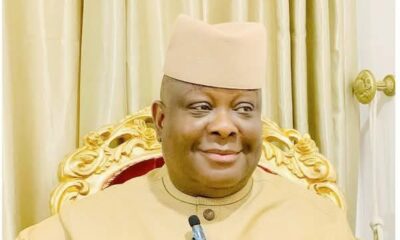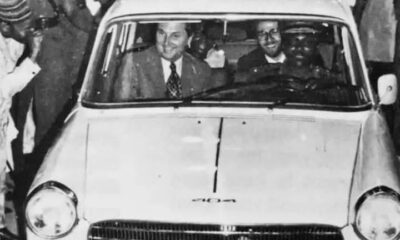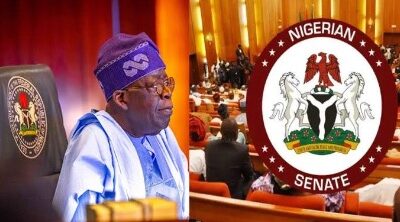Politics
Ukraine’s Zelenskyy in Berlin for ‘victory plan’ talks
Ukrainian President Volodymyr Zelenskyy continues his whirlwind tour of European capitals, presenting his ‘victory plan’ to end the war. German Chancellor Scholz has promised continued support.
Volodymyr Zelenskyy is meeting with German Chancellor Olaf Scholz in Berlin for talks on securing support for Kyiv’s “victory plan” to end the war.
Scholz told a press conference alongside Zelenskyy that Germany would not allow “Russia to dictate terms of peace.”
However, both leaders said they wanted to achieve a “just peace” for Ukraine, and indicated a desire for talks with Russia, something neither country has often said since Russia invaded in early 2022.
Zelenskyy’s stop in Berlin comes after he met with European leaders in London, Paris and Rome on Thursday.
Here are the latest developments on Russia’s war in Ukraine from Friday, October 11:
Why Zelenskyy’s Germany visit no longer includes a Biden meeting
The Ukrianian president’s European whirlwind tour was originally supposed to culminate with talks with President Joe Biden, just a matter of weeks before elections in the US.
However, these plans changed when Biden said he would cancel his trip to the US’ Ramstein Air Base in Germany to chair a meeting of the Ukraine Contact Group.
Biden said he would stay behind to help deal with the aftermath of Hurricane Milton instead.
Two hurricanes in fairly short succession hitting the southeast of the US have turned into something of an election football in recent weeks, even though presidents typically never visit disaster areas until the immediate danger is passed — for fear that their presence and the resources this demands detracts from rescue efforts.
The election on November 5 could prove decisive for Ukraine and its European allies in 2025, particularly in the event that Republican candidate Donald Trump wins.
However, western leaders including new NATO Secretary General Mark Rutte have been trying to play down this prospect this week. Rutte said in London on Thursday, also in Zelenskyy’s presence, that he had no concerns about a potential future Trump administration withdrawing support for Ukraine.
Scholz: Western support key to show Putin ‘playing for time won’t work’
German Chancellor Olaf Scholz said continued support for Ukraine was crucial in order to make it clear to Russian President Vladimir Putin that “playing for time will not work” in the conflict.
Appearing alongside Ukrainian President Volodymr Zelenskyy in Berlin, Scholz said Germany’s support for Kyiv would not waver.
He also said that this conviction would also be the basis “on which we together explore all possibilities for routes towards a just and lasting peace for Ukraine.”
Scholz said that he and Zelenskyy were agreed that there should be another peace conference, and that Russia should participate this time.
“What’s clear is that a realization of peace can only come to pass in accordance with international law,” Scholz said, adding “we will not accept any peace dictated by Russia.”
Zelenskyy thanks Scholz for pledging new military aid
Ukrainian President Volodymyr Zelenskyy thanked Germany and Scholz for their “strong support” for Ukraine, and also for fresh pledges for funding in 2025.
At a meeting with Zelenskyy in Berlin, Scholz announced a €1.4 billion ($1.53 billion) military aid package by the end of 2024.
“We need to think about next year, and to think about keeping up the level of support,” Zelenskyy said.
He said German assistance in areas like air defense “saves thousands of Ukrainian lives and gives our villages and cities a chance to protect ourselves.”
He noted more advanced weaponry Germany sent, often after some internal delays and discussions, including IRIS-T surface-to-air missile systems and “Gepard” or “Cheetah” armored vehicles.
Zelenskyy said his country wanted a “just peace” and “victory” against Russia, and, like Scholz, accused Russia of having no interest in talks.
“We see that Russia is not interested in honest diplomacy or in ending this war according to the UN statutes.
“We demand a just peace for Ukraine, a victory for us, and that is what we are working on every day,” he said.
He said that, to this end, he wanted to present Scholz with Kyiv’s plan “as to how we believe we can force Russia to agree to peace and end this war.”
“We would like this to happen next year, 2025,” he said but also said “we have to build a bridge to a peace summit that generates results that can draw a line under this war.”
He concluded by saying he believed that “together with our partners,” this plan could be realized, and “we are counting on German support.”
Germany’s 2024 budget earmarks €7.1 billion for Ukraine military assistance in 2024, and foresees €4 billion for 2025.
Scholz pledges help defending and mending electricity infrastructure
Chancellor Olaf Scholz told Volodymyr Zelenskyy that Germany would remain a major donor, the second largest in gross terms, for Ukraine this year and next.
“I can promise you that this will continue,” Scholz said alongside Zelenskyy in Berlin.
The chancellor also referred to Ukraine’s energy infrastructure as “the third winter in this murderous war approaches.”
He said that Russia was intentionally targeting Ukraine’s power generation and supply facilities, in order to break the endurance of the civilian population, clearly that is Putin’s aim.”
Germany would “help Ukraine in very specific terms” in this area, Scholz said, noting fresh funds and other agreed measures seeking to assist.
Zelenskyy arrives in Berlin for Scholz talks
Volodymyr Zelenskyy touched down in Berlin on Friday, television footage showed, with Chancellor Olaf Scholz greeting him at his offices.
The Ukrainian president and German chancellor could be seen walking away from the helicopter Zelenskyy had arrived in.
German FM hails anti-nuclear weapon Nobel Peace Prize as ‘aggressive powers’ again threaten their use
Germany’s Foreign Minister Annalena Baerbock praised the decision to give the Nobel Peace Prize to the Japanese anti-nuclear weapons group Nihon Hidankyo on Friday.
Without mentioning Russia by name, she seemed to indicate it also served as a signal in Moscow’s direction.
“Particularly in times, when aggressive powers are again threatening the use of nuclear weapons, it is all the more important that the world makes clear what peace means,” Baerbock said. “Peace means that such weapons are never used.”
Baerbock was speaking alongside her Slovakian counterpart, Juraj Blanar, who visited Berlin for talks on Friday.
The German foreign minister also appealed for more support for Ukraine’s air defense, saying Russian attacks on Ukrainian energy infrastructure with winter approaching were an attempt “to force people in Ukraine into a brutal and cold war.”
Baerbock said roughly two-thirds of Ukraine’s energy facilities had been damaged or destroyed.
She said that Ukraine’s President Zelenskyy, expected soon after in Berlin, was “ready for a just peace,” but alleged that the same could not be said of Russia’s Vladimir Putin.
Nobel laureate warns against use of nuclear weapons in Ukraine
The co-chair of the Japanese atomic bomb survivors’ group Nihon Hidankyo, which was awarded the Nobel Peace Prize on Friday morning, has made an emotional plea against the use of nuclear weapons in Ukraine and other conflicts.
“It has been said that because of nuclear weapons, the world maintains peace. But nuclear weapons can be used by terrorists,” Toshiyuki Mimaki said.
“For example, if Russia uses them against Ukraine, Israel against Gaza, it won’t end there. Politicians should know these things.”
German FM says Putin unwilling to speak with Scholz
Russian President Vladimir Putin is not willing to discuss the war in Ukraine with German Chancellor Olaf Sholz, Germany’s foreign minister said on Friday.
“He refuses to accept peace and every day sends another signal in favor of war and destruction. These days, he is no longer even prepared to speak to the German chancellor on the phone,” Annalena Baerbock told reporters in Berlin.
The comments come hours after a national poll found that a majority of Germans want the two leaders to speak over the phone.
Zelenskyy and Pope Francis exchange gifts
Pope Francis held a private meeting with Ukrainian President Volodymyr Zelenskyy at the Vatican City on Friday morning.
The two leaders exchanged gifts at the end of the 35-minute meeting.
Francis gifted the Ukrainian leader a bronze sculpture of a flower growing next to a bird, inscribed with the phrase “Peace is a fragile flower.”
Zelenskyy gave the pope an oil painting depicting a child amid ruins in Bucha, a town that Russian forces occupied for 33 days in 2022.
The pope has frequently called for peace in Ukraine and prays for its “martyred” people. However, he sparked outrage in Kyiv earlier this year after an interview where he called on Ukrainians to “raise the white flag and negotiate.”
Friday’s meeting was Zelenskyy’s second private audience at the Vatican since the Russian invasion of Ukraine in February 2022.
Earlier, on Thursday, Francis also met with the head of the Ukrainian Greek Catholic Church, Major Archbishop Sviatoslav Shevchuk.
Ukraine says it controls half of key Donetsk city
Ukraine controls around half of the strategically important city of Toretsk in the east, Ukrainian officials said on Friday.
The Ukrainian military has reported eight clashes around the hilltop city in the Donetsk region over the past day.
It comes as Russian forces have gradually pushed further into Ukraine in recent weeks.
“Approximately 40-50% of the city can be said to be under the control of the Ukrainian armed forces, while the rest of the territory is captured by the enemy,” said Vasyl Chynchyk, head of Toretsk city military administration.
Chynchyk said that around 1,150 people remain in the city, with evacuations continuing.
Russian strikes on Odesa kill 4
At least four people were killed by Russian strikes on Odesa overnight, Ukrainian authorities said on Friday morning.
Regional Governor Oleg Kiper said the Russian strikes destroyed a two-storey building in the Black Sea port city.
“The enemy attacked the Odesa region with ballistic missiles. Four people were killed, including a teenager,” Kiper said on social media.
Another 10 people were wounded, he added.
Most Germans want Scholz and Putin to talk — survey
A majority of Germans want Chancellor Olaf Scholz to speak with Russian President Vladimir Putin, according to a survey released on Friday.
The poll was conducted by opinion research institute YouGov on behalf of Germany’s DPA news agency.
The results showed that 59% of respondents were in favor of the two leaders talking over the phone, while 26% opposed it and 15% did not provide an answer.
The figure increased in eastern Germany, where 68% of the respondents said they wanted the two leaders to talk, compared to 19% who said they opposed it.
Putin and Scholz have almost entirely not spoken since Russia invaded Ukraine in February 2022.
Putin arrives in Turkmenistan for regional summit
Russian President Vladimir Putin arrived in Turkmenistan on Friday ahead of a summit hosted by Ashgabat where he is due to speak, Russian state media reported.
Regional leaders including Iran’s President Masoud Pezeshkian are set to attend the event.
Putin is also due to hold talks with Turkmen President Serdar Berdymukhamedov.
Zelenskyy to meet with Olaf Scholz, Pope Francis
Ukrainian President Volodymyr Zelenskyy will continue his two-day European tour on Friday.
He is set to meet with Pope Francis at the Vatican City on Friday morning, before traveling to Germany.
In Berlin, Zelenskyy will hold talks with Germany’s Chancellor Olaf Scholz and President Frank-Walter Steinmeier.
The leaders are expected to discuss arms deliveries as well as a potential peaceful solution to the conflict.
Zelenskyy’s planned meetings on Friday follow similar talks in London, Paris and Rome on Thursday.
Politics
IMO WEST SENATOR IZUNASO WARNS AGAINST RISING TREND OF ILL-PREPARED LEADERS IN NIGERIA.
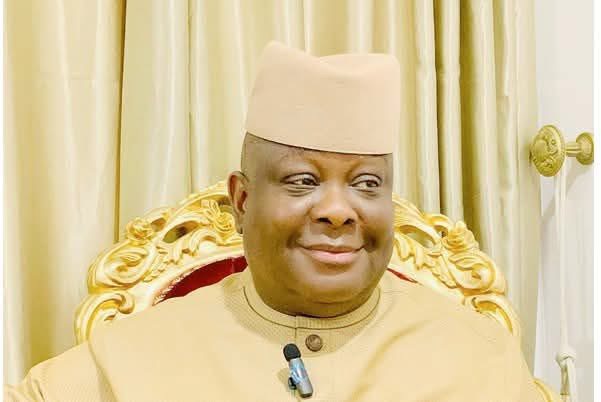
By Prince Uwalaka Chimaroke
17- DEC- 2025
The Senator representing Imo West Senatorial District and Chairman of the Senate Committee on Capital Markets, Senator Osita Izunaso, has expressed deep concern over what he described as the increasing occupation of political offices by individuals lacking the training, discipline, and values required for effective leadership.
Speaking in Abuja on Wednesday at the public presentation of Leadership 365: Daily Reflection for Effective Leadership, authored by Dr. Linus Okorie, President of the GOTNI Leadership Centre, the lawmaker noted that leadership in Nigeria is often misunderstood as merely holding public office rather than demonstrating character, competence, and vision.
Senator Izunaso stressed that authority does not automatically confer leadership, lamenting the absence of intentional leadership development structures in the country. According to him, many political actors assume leadership positions without adequate preparation, resulting in poor conduct, weak decision-making, and a disconnect from the people they serve.
He explained that true leadership reflects in attitude, speech, and behaviour, noting that leaders are constantly under public scrutiny and must therefore conduct themselves with responsibility and restraint. He added that leadership is not exclusive to political office holders, pointing out that leaders often emerge naturally in everyday settings based on influence and character rather than titles.
The lawmaker commended Dr. Okorie for contributing to leadership discourse through his book, describing it as a thoughtful work that highlights leadership as a daily responsibility applicable to all spheres of life. He emphasized that leadership is often revealed through action and integrity, not position, and can be identified even among children through observation of behaviour and influence.
Addressing young Nigerians, Senator Izunaso cautioned against the growing obsession with quick wealth, urging them instead to embrace mentorship and positive role models whose lives reflect sound values. He advised that money should not be the primary measure for choosing role models, stressing the importance of character and long-term impact.
The senator further observed that while technology and artificial intelligence are shaping the modern world, they can never replace the power of the human spirit. He noted that when properly guided, human capacity can drive meaningful change capable of transforming institutions, economies, and nations.
In his remarks, Dr. Okorie underscored the importance of deliberate leadership grooming, stating that nations that have achieved sustainable development did so by investing consciously in leadership capital. He explained that the book was written to encourage consistent self-reflection and inspire individuals committed to making a positive difference in society.
Observers note that concerns about leadership quality have remained a recurring issue in Nigeria’s governance discourse, with critics often pointing to weak institutions, policy inconsistency, and a political culture that prioritizes patronage over competence as major challenges to national development.
Politics
Engineers Farouk Ahmed, Gbenga Komolafe resign, President Tinubu nominates successors to the Senate for approval
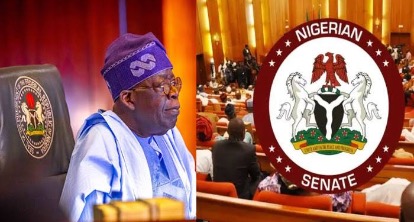
President Bola Ahmed Tinubu has asked the Senate to approve the nominations of two new chief executives for the Nigerian Midstream and Downstream Petroleum Regulatory Authority (NMDPRA) and the Nigerian Upstream Petroleum Regulatory Commission (NUPRC).
The requests followed the resignation of Engineer Farouk Ahmed of the NMDPRA and Gbenga Komolafe of the NUPRC. Both officials were appointed in 2021 by former President Buhari to lead the two regulatory agencies created by the Petroleum Industry Act (PIA).
To fill these positions, President Tinubu has written to the Senate, requesting expedited confirmation of Oritsemeyiwa Amanorisewo Eyesan as CEO of NUPRC and Engineer Saidu Aliyu Mohammed as CEO of NMDPRA.
The two nominees are seasoned professionals in the oil and gas industry.
Eyesan, a graduate of Economics from the University of Benin, spent nearly 33 years with the NNPC and its subsidiaries. She retired as Executive Vice President, Upstream (2023–2024), and previously served as Group General Manager, Corporate Planning and Strategy at NNPC from 2019 to 2023.
Engineer Saidu Aliyu Mohammed, born in 1957 in Gombe, graduated from Ahmadu Bello University in 1981 with a Bachelor’s in Chemical Engineering. He was announced today as an independent non-executive director at Seplat Energy.
His prior roles include Managing Director of Kaduna Refining and Petrochemical Company and Nigerian Gas Company, as well as Chair of the boards of West African Gas Pipeline Company, Nigeria LNG subsidiaries, and NNPC Retail.
He also served as Group Executive Director/Chief Operating Officer, Gas & Power Directorate, where he provided strategic leadership for major gas projects and policy frameworks, including the Gas Masterplan, Gas Network Code, and contributions to the Petroleum Industry Act (PIA).
Engineer Mohammed played a pivotal role in delivering key projects such as the Escravos–Lagos Pipeline Expansion, the Ajaokuta–Kaduna–Kano (AKK) Gas Pipeline, and Nigeria LNG Train.
EVENTS
PRESIDENT TINUBU CONGRATULATES SENATOR IFEANYI ARARUME ON HIS BIRTHDAY
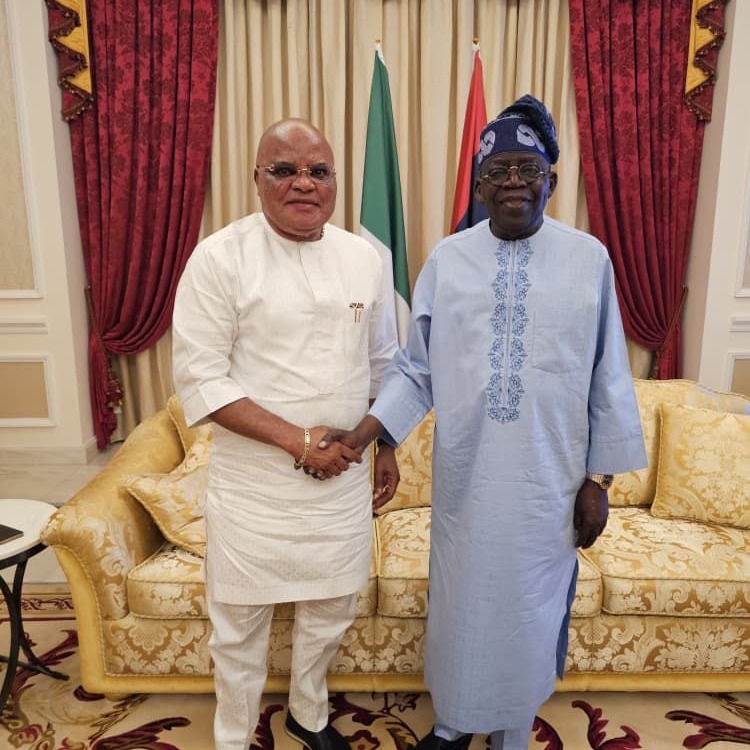
President Bola Tinubu felicitates Senator Ifeanyi Godwin Ararume, astute politician and accomplished businessman, on his birthday, December 16.
Senator Ararume’s odyssey in politics began in the late 1980s, when he served as the State Treasurer of the Liberal Convention in old Imo State. He later joined the National Finance Committee of the defunct National Republican Convention.
He represented Imo North in the 9th National Assembly. He was first elected in May 1999 and re-elected in April 2003. He also served on several committees and held other official roles.
President Tinubu commends the former senator for his years of service to the nation and contributions to its peace, unity, and progress.
The President describes Senator Ararume as a resolute and shrewd politician, highlighting his courageous and remarkable political journey through the years.
President Tinubu wishes Senator Ararume a happy 67th birthday and prays that God Almighty will grant him more years of good health and strength.
-
Business1 year ago
US court acquits Air Peace boss, slams Mayfield $4000 fine
-

 Trending1 year ago
Trending1 year agoNYA demands release of ‘abducted’ Imo chairman, preaches good governance
-

 Politics1 year ago
Politics1 year agoMexico’s new president causes concern just weeks before the US elections
-

 Politics1 year ago
Politics1 year agoPutin invites 20 world leaders
-

 Politics1 year ago
Politics1 year agoRussia bans imports of agro-products from Kazakhstan after refusal to join BRICS
-
Entertainment1 year ago
Bobrisky falls ill in police custody, rushed to hospital
-
Entertainment1 year ago
Bobrisky transferred from Immigration to FCID, spends night behind bars
-
Education1 year ago
GOVERNOR FUBARA APPOINTS COUNCIL MEMBERS FOR KEN SARO-WIWA POLYTECHNIC BORI

